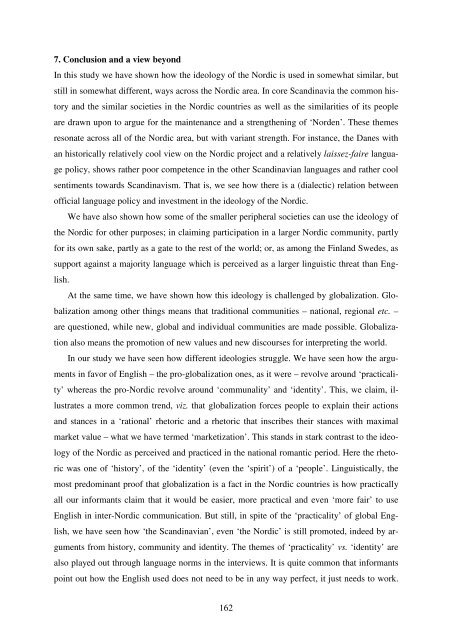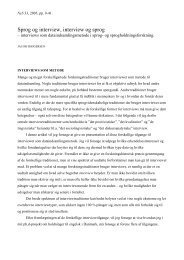Hør dog hvad de siger - Note-to-Self: Trials & Errors
Hør dog hvad de siger - Note-to-Self: Trials & Errors
Hør dog hvad de siger - Note-to-Self: Trials & Errors
You also want an ePaper? Increase the reach of your titles
YUMPU automatically turns print PDFs into web optimized ePapers that Google loves.
7. Conclusion and a view beyond<br />
In this study we have shown how the i<strong>de</strong>ology of the Nordic is used in somewhat similar, but<br />
still in somewhat different, ways across the Nordic area. In core Scandinavia the common his-<br />
<strong>to</strong>ry and the similar societies in the Nordic countries as well as the similarities of its people<br />
are drawn upon <strong>to</strong> argue for the maintenance and a strengthening of ‘Nor<strong>de</strong>n’. These themes<br />
resonate across all of the Nordic area, but with variant strength. For instance, the Danes with<br />
an his<strong>to</strong>rically relatively cool view on the Nordic project and a relatively laissez-faire langua-<br />
ge policy, shows rather poor competence in the other Scandinavian languages and rather cool<br />
sentiments <strong>to</strong>wards Scandinavism. That is, we see how there is a (dialectic) relation between<br />
official language policy and investment in the i<strong>de</strong>ology of the Nordic.<br />
We have also shown how some of the smaller peripheral societies can use the i<strong>de</strong>ology of<br />
the Nordic for other purposes; in claiming participation in a larger Nordic community, partly<br />
for its own sake, partly as a gate <strong>to</strong> the rest of the world; or, as among the Finland Swe<strong>de</strong>s, as<br />
support against a majority language which is perceived as a larger linguistic threat than Eng-<br />
lish.<br />
At the same time, we have shown how this i<strong>de</strong>ology is challenged by globalization. Glo-<br />
balization among other things means that traditional communities – national, regional etc. –<br />
are questioned, while new, global and individual communities are ma<strong>de</strong> possible. Globaliza-<br />
tion also means the promotion of new values and new discourses for interpreting the world.<br />
In our study we have seen how different i<strong>de</strong>ologies struggle. We have seen how the argu-<br />
ments in favor of English – the pro-globalization ones, as it were – revolve around ‘practicali-<br />
ty’ whereas the pro-Nordic revolve around ‘communality’ and ‘i<strong>de</strong>ntity’. This, we claim, il-<br />
lustrates a more common trend, viz. that globalization forces people <strong>to</strong> explain their actions<br />
and stances in a ‘rational’ rhe<strong>to</strong>ric and a rhe<strong>to</strong>ric that inscribes their stances with maximal<br />
market value – what we have termed ‘marketization’. This stands in stark contrast <strong>to</strong> the i<strong>de</strong>o-<br />
logy of the Nordic as perceived and practiced in the national romantic period. Here the rhe<strong>to</strong>-<br />
ric was one of ‘his<strong>to</strong>ry’, of the ‘i<strong>de</strong>ntity’ (even the ‘spirit’) of a ‘people’. Linguistically, the<br />
most predominant proof that globalization is a fact in the Nordic countries is how practically<br />
all our informants claim that it would be easier, more practical and even ‘more fair’ <strong>to</strong> use<br />
English in inter-Nordic communication. But still, in spite of the ‘practicality’ of global Eng-<br />
lish, we have seen how ‘the Scandinavian’, even ‘the Nordic’ is still promoted, in<strong>de</strong>ed by ar-<br />
guments from his<strong>to</strong>ry, community and i<strong>de</strong>ntity. The themes of ‘practicality’ vs. ‘i<strong>de</strong>ntity’ are<br />
also played out through language norms in the interviews. It is quite common that informants<br />
point out how the English used does not need <strong>to</strong> be in any way perfect, it just needs <strong>to</strong> work.<br />
162



